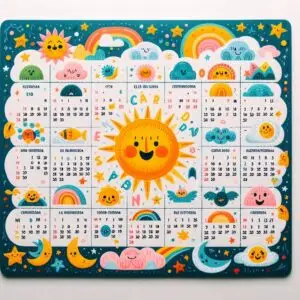Learning a new language often feels like piecing together a beautiful puzzle – challenging but rewarding. Among the many intriguing facets of mastering the Spanish language is acquainting oneself with the days of the week in Spanish, a fundamental aspect that enriches daily conversation and cultural understanding. This article delves into this essential vocabulary, offering learners a delightful journey through the week as seen through the playful activities of two young children, Rafael and Jimena. Whether you’re looking to learn Spanish online or expand your knowledge through free time, this exploration of the week promises to be both educational and engaging.
Days of the Week in Spanish
The days of the week in Spanish, starting with lunes (Monday), offer more than just a calendar guide—they hold clues about the vibrant life and culture in Spanish-speaking countries. From the Roman god Mars, for whom Tuesday (martes) is named, to Thor represented in Thursday (jueves), these days reveal ties to both history and culture. Mastering these terms helps open doors to better communication and deeper connections with Spanish-speaking people.
But why stop at rote learning? Let’s embark on a practical adventure using the week’s narrative, braided into the lives of Rafael and Jimena.
Vocabulary List: Days of the Week and Kid Activities
Before diving deeper, let’s familiarize ourselves with some key terms in our podcast narrative:
| Spanish Day | English Day | Example Activity |
|---|---|---|
| Lunes | Monday | Rafael goes to school. |
| Martes | Tuesday | Rafael attends swimming class. |
| Miércoles | Wednesday | They have dance class. |
| Jueves | Thursday | Rafael learns art skills. |
| Viernes | Friday | They visit their grandmother. |
| Sábado | Saturday | The family visits the zoo. |
| Domingo | Sunday | They rest and read stories. |
Example Sentences:
- El lunes, Rafael va a la escuela. (On Monday, Rafael goes to school.)
- El martes, Rafael tiene clase de natación. (On Tuesday, Rafael has a swimming class.)
- El viernes, pasan tiempo con su abuela. (On Friday, they spend time with their grandmother.)
Incorporating these vocabulary words into your daily practice, whether through apps found on the App Store or Google Play, enriches your pronunciation and supports a more intuitive learning process.
Additional Vocabulary and Phrases
To deepen your understanding of weekly activities in Spanish:
- Despertarse temprano: (To wake up early)
- Jimena se despierta temprano para preparar sus juguetes. (Jimena wakes up early to prepare her toys.)
- Aprender a nadar: (To learn to swim)
- Rafael aprende a nadar de espalda en la clase de natación. (Rafael learns to swim backstroke in his swimming class.)
- Hacer la tarea: (To do homework)
- Rafael hace la tarea con la ayuda de su papá, Carlos. (Rafael does homework with the help of his dad, Carlos.)
- Cuento: (Story)
- Ana les lee un cuento a Rafael y Jimena antes de dormir. (Ana reads a story to Rafael and Jimena before bed.)
Enhancing Your Language Learning Online
When you aim to learn Spanish or specifically master the days of the week in Spanish to English, diverse resources make the journey both comprehensive and enjoyable. Consider Spanish courses, engaging podcasts, or the catchy “days of the week in Spanish song” that helps with memory through melody. Online platforms offer flexibility, whether you’re sifting through classes or talking with peers. Embracing these resources encourages not just learning, but also speaking Spanish with confidence.
Summary
Learning the Spanish days of the week entails more than memorization. It involves immersing oneself in cultural narratives and linguistic practices that bring words to life. Through Rafael and Jimena’s vibrant week, we witnessed more than activities—they revealed a story of growth, fun, and family bonds.
\We encourage you to explore more podcasts and stories, unlock varied Spanish pronunciation patterns, and witness how learning Spanish can transform your connection to the language and its speakers. Enjoy each week as an opportunity to grow, learn, and experience the Spanish culture woven into everyday life.
